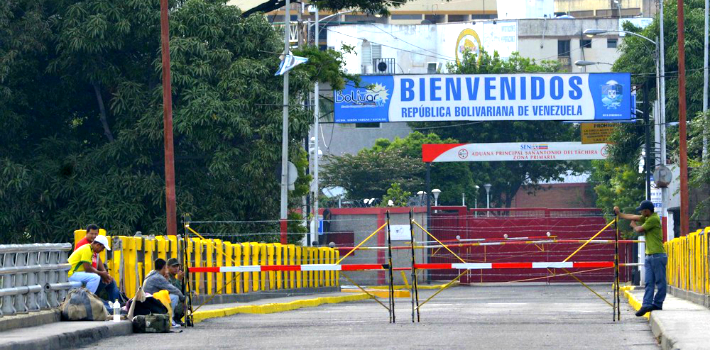
EspañolNicolás Maduro’s latest outburst has caused a grave humanitarian crisis on the Colombian border.
Last week, a group of Colombian smugglers allegedly ambushed members of the Venezuelan military, injuring three of them. What began as a simple security situation in the socialist country then quickly escalated.
Maduro has since taken increasingly disproportionate measures, including unilaterally shutting down the border for 72 hours and deporting Colombian citizens from Venezuela. He ordered soldiers to mark the homes of those Colombians living near the border, destroy vacant houses, and take the belongings of those who have been deported.
The justification for these excesses is the same one these Venezuelan satraps always give: Colombian paramilitary groups are to blame for all of Venezuela’s problems, and not 21st-century socialism.
As usual, public opinion on the situation is divided in Colombia. Some believe Maduro was simply responding to the Colombian government’s inability to prosecute and control smugglers. Others, such as Bogotá Mayor Gustavo Petro, as well as other representatives of the Colombian populist left, think Maduro’s word is good enough.
At the other end of the spectrum, we find Senator Álvaro Uribe Vélez, the former president who Maduro recently insulted. Uribe responded to Maduro’s actions by traveling to the border zone and slamming the Venezuelan dictatorship.
Meanwhile, the Juan Manuel Santos administration released a belated, tepid statement, reaffirming their radical position of not disturbing Venezuelan authorities on the border.
At this point, trying to figure out the Venezuelan government’s motivations in this case doesn’t do us much good. It is not about whether Maduro is rational or irrational, if his measures are improvised or a deliberate smokescreen for the upcoming elections, or whatever the case might be.
As I pointed out more than a year ago in this very column, two things guide the Venezuelan regime’s actions.
[adrotate group=”7″]
The first is xenophobia, persecution, the creation of scapegoats, and disregard for life and private property — all the typical features of a totalitarian regime. Therefore, we cannot reduce the discussion to whether the cause is situational, or if it is due to the upcoming elections in December. So long as 21-century socialism remains in power in Venezuela, we can expect these kind of decisions and worse.
The second factor is the economic crisis and the pressure that places on the Venezuelan government. Public support for the regime has dwindled and this suggests that the abuses will not only continue, but may become increasingly more violent.
Only when the true nature of the Venezuelan dictatorship is understood in Colombia will we be able to expand the debate on the decisions the Maduro government makes. It is precisely this lack of understanding that has led the Santos administration to naively adopt a policy of complacency.
It is important to point out that this does not mean the Colombian government is to blame for what is happening on the border. On the contrary, no matter what policy Colombia adopts, the Venezuelan dictators would have still created a crisis to further the consolidation of their regime.
However, Santos’s complacent attitude on the issue has given the Venezuelan dictatorship the impression that they have the implicit authorization to advance their abuses against Colombian citizens unabated.
Furthermore, this attitude has made many Colombians feel unprotected by their government, and has encouraged them to rest their hopes for change in less than ideal alternatives.
All that being said, one can certainly criticize the Colombian Foreign Ministry for such a lukewarm response to the crisis, but what else could the government possibly do? Cut off diplomatic relations? Send troops to the border? Insult Maduro? Declare war?
None of that would solve the problem. In fact, it would only make it worse, and potentially give the Venezuelan dictatorship more ammunition to justify their abuses.
No, what really matters today is the looming humanitarian crisis. This is where the discussion in Colombia should be focused.
Our country’s relationship with Venezuela is a lost cause until their regime falls, just like all oppressive dictatorships eventually do.
 Versión Español
Versión Español













